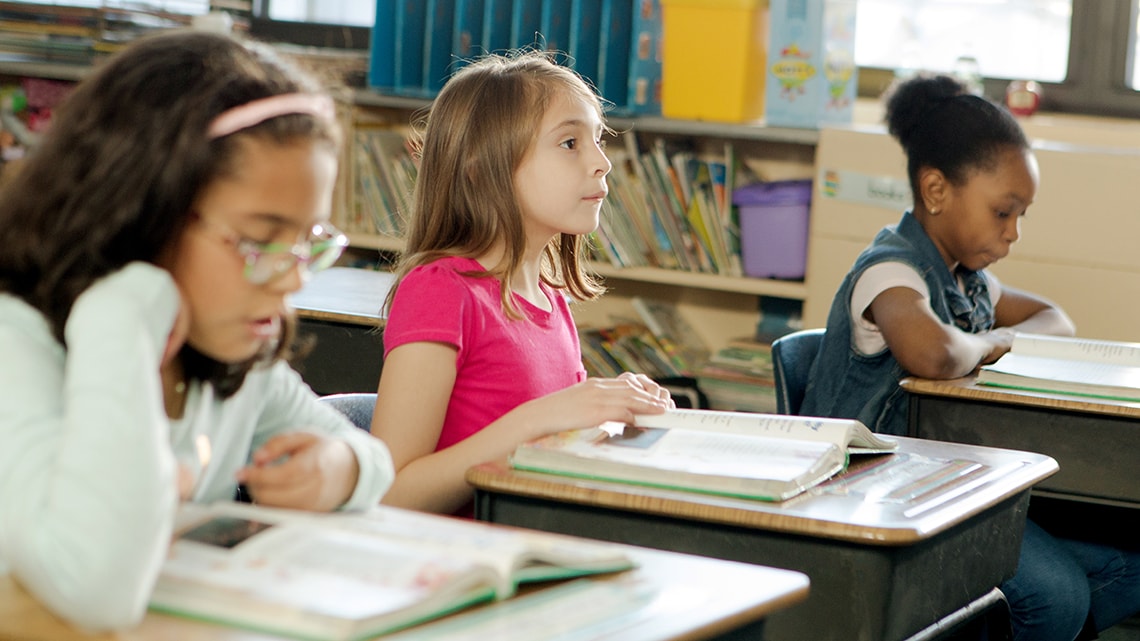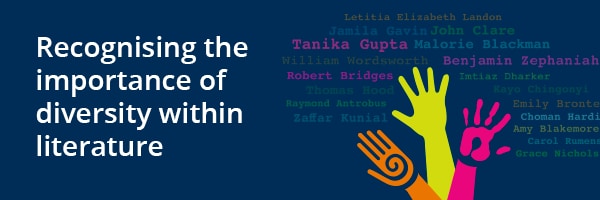Improving inclusivity on the GCSE Literature syllabus

In response to students’ concerns about the lack of inclusion of women and BAME writers at GCSE level, Katy Lewis, Head of English, Drama and Languages at Pearson, discusses the move to add a more diverse set of texts to the English GCSE Literature syllabus.
Originally published January 2020 in Creative Teaching and Learning Magazine
As part of our role as an awarding organisation, we constantly review and analyse our qualifications, checking that they are, and remain, fit for purpose. This includes looking at things like how students cope with the demands of the assessment, the amount of content and the assessment structures, and it can lead to changes being introduced in order to improve the assessment experience for students.
For example, we introduced additional scaffolding into the GCSE English Language examination this summer and slightly increased the length of the exam, based on teacher feedback and outcomes of our annual reviews.
However, since the new specifications have started being taught, there has been a much larger conversation which students have often led on, which is less concerned about iterative improvements to examinations, and instead directly challenges the assumptions which make up the subject conditions themselves. For example, what constitutes classic literature and the literary canon, how are those texts assigned with ‘classic’ status, and by whom?
Where are the women?
In late 2015, I went to The Forest Academy School to speak to teachers and students who had been in touch with Pearson directly about the inclusion of women authors and authors from BAME backgrounds in A level specifications. The students and teachers had been concerned over the lack of diversity in the choices which were available to them after the new specifications were made available for first teaching in September 2015. And they were not the only ones.
The English team had recently started working with Deidre Osbourne at Goldsmiths University of London to develop an A level coursework resource on Black British Literature, as a reference for teachers to support students who may have an interest which had been previously under-represented in their experience of British Literature. Having the opportunity to talk about this new resource with young people, and to listen to their experiences as students of Literature, prompted us to go back to our own text selections at GCSE level, and to openly and honestly reflect on our options. And more than this, to think about our role in contributing to the creation of ‘classic literature’ and ‘literary canon’ as categories for study.
What does it tell students that the same texts, by the same authors, are studied year after year? And what does it say to the young British people reading these books, which have been specifically selected as encompassing the depth and power of the English literary heritage, and when the authors are more often male, white and deceased?
Is the canon racist?
While we embarked upon a period of research with teachers and other stakeholders into the question around diversity in English literature, and what our next steps should be, students continued to be at the forefront of moving the debate about inclusion of writers from BAME backgrounds forward. Not least of all with the arguments that followed the publication of an open letter ‘Decolonising the English Faculty’, which was signed by more than 100 students at the University of Cambridge.
We were particularly interested in the students’ position that the English teaching they had experienced had reinforced systemic racism by elevating white authors to the exclusion of all others. Our engagement with these questions was about more than adding texts to a specification. Instead, it was a means for us to take our responsibilities and accountabilities seriously in being part of the ‘industry’ that agrees what English literature is, who writes it, who it is written about, and who it is written for.
So, within this wider context of debates, academic argument and student-led protest, we started on the project of adding texts to our English Literature specification – not as a supplementary guide or suggested wider reading, but as a core part of the text choices which contribute to students’ GCSE qualification, and which therefore, by the very nature of their inclusion, are examples of the best that has been thought and written and represent the depth and power of the English literary heritage.
Working within strict parameters
You have probably never thought about this, but selecting texts for a GCSE specification is very challenging, and all other reasons notwithstanding, it is easy to see why some texts have been returned to again and again.
A GCSE text must appeal to a 15 to 16-year-old audience, but it must not contain content which is too adult, or language which is inappropriate for the age group. It must have sufficient language and structural challenge to allow the most able students to gain a grade 9 through the quality of their analysis, but also be accessible enough for a student who is working towards a grade 3 to be able to understand and engage with the content and succeed in answering questions on what they have read, to the best of their abilities. A GCSE text must also have a context that is relatable to the narrative or characters of the text, so that students can draw upon this to support their understanding but avoid common pitfalls of adding in bits of contextual information which fall into trivia, rather than developing an argument. Finding a text which meets these requirements can be a difficult job. And it can take a while.
And now, two years after we started, we are delighted to be able to announce the addition of two new novels, two new plays and a new poetry collection to our Pearson Edexcel GCSE (9–1) English Literature text list.
We want students to be exposed to literature from a variety of British authors from different backgrounds. We want them to read about issues that they can engage with and relate to. To be exposed to writers, protagonists and narratives that can challenge their own experiences in a way that literature is so well-placed to do – developing empathy and the ability to view the world from a broader range of perspectives. The new texts are The Empress by Tanika Gupta (2013), Refugee Boy by Benjamin Zephaniah adapted by Lemn Sissay (2013), Coram Boy by Jamila Gavin (2004) and Boys Don’t Cry by Malorie Blackman (2011). The new poetry collection, in collaboration with The Poetry Society, includes 15 poems that each reflect a sense of belonging, whether it be through identity, culture, heritage, nature or friendship.
We hope that this is still the beginning of the discussion, and that the conversation around who English Literature at GCSE is for and by will continue to develop, and that Pearson’s role in that conversation will also continue, as we focus on listening to students, learning from them, and playing our part.
It is within the parameters of the subject criteria, overseen and ultimately accredited by the qualifications regulator Ofqual, that all awarding organisations develop their qualifications. So, ultimately, these become the content of GCSE Literature courses which all students follow.
For users of the AQA specification, in addition to the Shakespeare plays and 19th century fiction requirements, teachers are offered one of six British plays, or six British novels, written since 1914:
Play |
|---|
| JB Priestley An Inspector Calls |
| Willy Russel Blood Brothers |
| Alan Bennett History Boys |
| Dennis Kelly DNA |
| Simon Stephens The Curious Incident of the Dog in the Night-Time |
| Shelagh Delaney A Taste of Honey |
Prose |
|---|
| William Golding Lord of the Flies |
| Telling Tales (AQA anthology) |
| George Orwell Animal Farm |
| Kazuo Ishiguro Never Let Me Go |
| Meera Syal Anita and Me |
| Stephen Kelman Pigeon English |
For users of the Pearson Edexcel specification, the choices were similar:
Play |
|---|
| JB Priestley An Inspector Calls |
| Harold Bridghouse Hobson’s Choice |
| Alan Bennett History Boys |
| R C Sherriff Journey’s End |
Prose |
|---|
| William Golding Lord of the Flies |
| Susan Hill The Woman in Black (AQA anthology) |
| George Orwell Animal Farm |
| Meera Syal Anita and Me |
These prose and drama options make up the choices for teachers of around 90% of learners in England.
From September 2019, Pearson Edexcel GCSE (9–1) English Literature text list also includes:
- The Empress, Tanika Gupta
- Refugee Boy, Benjamin Zephaniah (adapted for the stage by Lemn Sissay)
- Coram Boy, Jamila Gavin
- Boys Don’t Cry, Malorie Blackman
We have also created a new poetry collection called Belonging. The Belonging collection was written in collaboration with The Poetry Society and includes poets from various cultures to reflect a sense of belonging, whether it be identity, culture, family, heritage, nature or friendship.
To find out more about the new texts additions and to download our new Poetry collection, please visit our website.

Likewise, share what you think about the new additions by tagging @PearsonEdexcelEnglish on Facebook or @PearsonEdexcel on Twitter and use the hashtag #DiversityInLit to join in the conversation.
Katy Lewis is Head of English, Drama and Language Qualifications at Pearson.